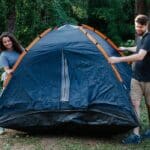At many companies, the employees dread the annual company retreat where they sit in office spaces and auditoriums with speakers and workshops wasting the day away. Switching the routine up to bring in fresh and new experiences, a company retreat can become the highlight of the year.
A camping trip is one of the best ways to take the company retreat, give it a total makeover, and bring excitement to employees and leadership staff alike. Not only does a company camping trip help make things more fun, but it can also be one of the best venues for leadership and team development.
Done well, a company retreat at a campground can dramatically boost morale and help everyone increase work performance in the long run. This article will help get the first or fifth company camping trip up and running for a successful retreat!
How Camping Functions as a Team-Building Exercise
Team building is a classic part of camping trips. Organizations and schools send students and employees through team-building development workshops at outdoor centers all the time. This is because the outdoors is the best possible venue for team building and group development.
For starters, the outdoors has proven to bring about a more positive mindset, which expands awareness and opens us up to new ideas. The nature of camping also leads to a lot of group work that doesn’t feel like work. Even without specific team-building exercises, plenty of it will happen naturally.
Setup
Setting up camp can take a long time when doing it alone. Framing the setup of camp as a group effort can push people to work together in ways that they haven’t before. If anyone has tried to set a tent up alone, they know the helpfulness of many hands.
Even more expensive camping tents can be a hassle, which is where the team comes into play.
Everyone will work together to help set up tents, group shelters, a camp kitchen, and collect firewood to get a campfire going. These roles and responsibilities can be split and shared, teaching effective delegation and teamwork tactics.
Every activity that the group will do while camping will require some level of setup, providing ample opportunities for everyone to take on leadership roles and practice completing shared tasks.
Communal Cooking
Cooking big dinners while on a company camping retreat is the perfect example of natural teamwork in the outdoors.
Cooking outside isn’t as simple as cranking the stove and throwing a few steaks on. The process is much more involved, especially when cooking for a large group. Everyone will need to come together and split tasks up. A few people are slicing vegetables while others collect water to boil over the fire that another group is starting.
We can’t forget the dishes. Cleaning dishes while camping is more complicated than tossing things into the dishwasher. With all the dishes, a large group of people will still take a fair amount of time to tackle the task collectively.
All of this working together for a common goal is what team building at a company retreat is all about!
Gathering and Maintaining Supplies
Campfires aren’t just enjoyable to look at, they can be helpful to manage the bugs and make everything better. Keeping a fire going for hours at a time requires a lot of firewood. Everyone must work together to collect enough wood, break it down, and keep the fire stoked.
While fire tending is often everyone’s favorite job, there are plenty of other group tasks to take care of. Water collection can be big, especially if the site is situated farther from a water source.
Gathering and maintaining supplies can help everyone work together. From planning and collecting all of the food before the trip to putting it all away neatly at the end, this is a team-building opportunity that happens throughout the entire experience.
How to Organize a Safe Camping Experience for a Group
In a perfect world, everyone comes away from group camping trips with closer relationships and plenty of lessons learned. An unsafe camping trip can lead to the complete opposite. Human resources sit at the core of this, as HR is the key factor in organizational success, including on retreats like camping.
A company camping trip will likely require filling out the right HR paperwork, explaining the rules and expectations, and briefing everyone on the requirements for a safe experience. Those in charge of the trip need to have the right working knowledge of basic survival skills in case of an emergency.
Each company will handle the HR sector differently than others. What they all share is paperwork. Talk to your HR director (who is hopefully joining on the camping retreat anyways!) to ensure you have all your bases covered. Write a detailed waiver, check it with administration, and ensure everyone has signed it before heading out.
In addition to having the paperwork, do all the work necessary not to need it! That means training any leadership in wilderness first aid, group leadership, and bringing other professionals in if necessary. There are many outdoor facilitators that specialize in group camping retreats, and they can add a lot to the trip if given a chance.
Do’s and Don’ts of Group Camping
Do: Have Enough Space
Make sure you have a campground large enough for your entire company. Not only do you need the space in the campground, you need the space for every individual to feel comfortable. That means bringing enough tents and bedding and ensuring you have the right campsite reservations with enough area to spend time in.
Camping tents can cost a lot, but they don’t have to. If you buy the right tent, each person can feel comfortable. This significantly influences how much they enjoy the experience and how much they take away from it.
Don’t: Expect People to Entirely Fend for Themselves
Many employees will have never gone camping before, and not everyone is naturally fit for life outdoors. Don’t expect everyone to show up with the right gear and knowledge for the trip.
You can work to find interest areas for everyone individually but also provide enough training and information beforehand that will help everyone prepare and know what to expect.
One of the most essential things on any camping trip is the food. Make sure there’s more than enough. People need to eat, and they may not expect how much more they need to eat when working outside.
Second to food is physical comfort. Bugs are one of the harshest factors when camping, and you need to know how to deal with bugs to have a good time. This can turn any camping trip completely around.
You may also try scheduling activities for everyone. This way, people aren’t sitting around trying to find things to do and being bored throughout the day. Plan engaging activities and create a playful and diverse environment that has something for everyone.
Do: Provide a Packing List
Again, don’t expect everyone to know what to bring. A packing list before the trip is the best way to ensure people show up with the right equipment, making them capable of enjoying the time rather than being uncomfortable.
A sample packing list would include the following:
Extra clothes – Having extra clothes will help everyone stay warm when the temperature inevitably drops at night.
Rain gear – Hopefully the rain stays away, but rain gear helps everyone stay comfortable even when it doesn’t.
Snacks – Some people are picky about their food, and it’s nice to have special snacks for yourself when sharing food with a group.
Sleeping bag – A comfortable sleeping bag can make all the difference at night.
Sleeping pad – As people age, a more comfortable sleeping pad becomes more important.
Water bottle – Hydration is even more important when camping, so a personal water bottle or hydration pack can help everyone remember to drink plenty of water.
Hydration additions – Many people won’t like the taste of water outside, so extra packets of flavoring with electrolytes can help everyone stay hydrated.
Medications – While everyone should be on top of this, it’s good to include them on the packing list to ensure there aren’t any medical emergencies that could have been easily prevented.
Reading material – For downtime on a camping trip, encourage employees to bring books along rather than trying to check their phones.
Don’t: Schedule Activities That Require Prior Training
A lot of outdoor activities require training before heading out. For example, a hunting trip would require weapons safety training, making it a dangerous activity to have for a group of people without that training.
Scheduling activities that anyone can do will help keep the trip as inclusive as possible. Hiking, fishing, birdwatching, group games, and basic survival courses are all great examples of activities that people without any experience can try out or be easily taught.






